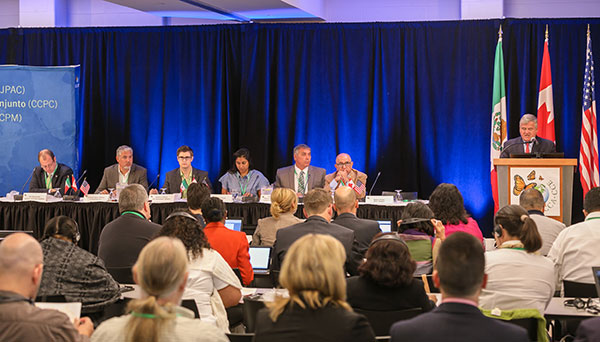New trilateral environmental initiatives announced by Commission for Environmental Cooperation (CEC)
The CEC to take action on environmental issues of mutual concern in North America and renew community grant program
Charlottetown, Prince Edward Island, 28 June 2017—Today, at the 24th annual Regular Session of the Council of the Commission for Environmental Cooperation (CEC), a new trilateral cooperative work program for the CEC was announced, with a strong focus on positively impacting the nexus between trade and the environment. This year’s Council session also featured a dialogue with the youth and the public on how innovation can accelerate clean growth and advance North American competitiveness.
Under the Operational Plan 2017–2018, the CEC will undertake ten cooperative projects that bring together experts on important environmental issues of regional concern, such as greening transport by reducing maritime shipping emissions, achieving legal and sustainable trade in select North American species, measuring and mitigating food loss and waste, protecting pollinators vital to food crops, advancing growth and conservation of migratory species through ecotourism, and improving cost effectiveness and environmental protection through increased industrial energy efficiency.
“The CEC remains committed to protecting and enhancing the environment of North America, a region rich in natural resources that we collectively depend on to support economic growth, sustainability, and our way of life. Through this cooperative work, the CEC will continue to play a vital role in bringing together a diversity of actors who take to heart the stewardship of our shared environment while supporting growth,” said César Rafael Chávez, Executive Director, Commission for Environmental Cooperation.
The North American Program for Environmental Community Action
The CEC also announced it will renew the North American Program for Environmental Community Action (NAPECA), its ongoing community grant program that supports local community projects on priority topics. A call for proposals will be announced in the near future.
Youth and the Environment in North America
This year’s CEC Council Session was also an opportunity to demonstrate the CEC’s continued commitment to increasing youth participation and engagement in relevant areas for the CEC. The CEC Joint Public Advisory Committee brainstormed with youth on tangible ways to engage youth in food waste and marine litter initiatives under the new work program. In addition, the winners of the CEC Youth Innovation Challenge were welcomed and recognized for their prize-winning innovations.
Traditional Ecological Knowledge
The Council also demonstrated its continued commitment to engaging with its Roster of Traditional Ecological Knowledge Experts and announced the renewal and update to the Roster’s terms of operation.
Looking forward, the United States accepted chairmanship of the CEC Council or the coming year, and announced it will host the 2018 CEC Council Session in Oklahoma City, Oklahoma.

About the CEC
The Commission for Environmental Cooperation (CEC) was established in 1994 by the governments of Canada, Mexico and the United States through the North American Agreement on Environmental Cooperation, a parallel environmental agreement to NAFTA. As of 2020, the CEC is recognized and maintained by the Environmental Cooperation Agreement, in parallel with the new Free Trade Agreement of North America. The CEC brings together a wide range of stakeholders, including the general public, Indigenous people, youth, nongovernmental organizations, academia, and the business sector, to seek solutions to protect North America’s shared environment while supporting sustainable development for the benefit of present and future generations
The CEC is governed and funded equally by the Government of Canada through Environment and Climate Change Canada, the Government of the United States of Mexico through the Secretaría de Medio Ambiente y Recursos Naturales, and the Government of the United States of America through the Environmental Protection Agency.